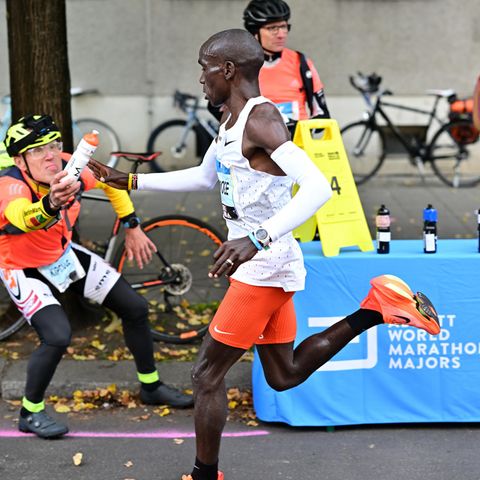Brandenburg coalition agreement
The SPD and BSW agree: the coalition agreement is in place
Copy the current link
The SPD and BSW want to govern together in Brandenburg and are thus breaking new ground in Germany. The coalition agreement is ready – but there were also disruptive maneuvers during the negotiations.
The SPD and the Sahra Wagenknecht Alliance (BSW) have agreed on a coalition agreement in Brandenburg. This paves the way for the first government alliance of this kind in Germany. SPD Prime Minister Dietmar Woidke said at the presentation of the almost 70-page coalition agreement in Potsdam: “Brandenburg needs stability and Brandenburg needs security.” Brandenburg is the second state in which the BSW wants to govern – in Thuringia the party wants to form a coalition with the CDU and SPD.
The SPD and BSW are aiming for five years of joint government in Brandenburg. “It won’t always be easy,” said BSW state and parliamentary group leader Robert Crumbach. Both sides spoke of difficult but fair coalition negotiations. Shortly before the conclusion, however, the talks stalled because unity was in question. The BSW was only founded as a party this year.
Woidke sees the focus on business, education and integration
Prime Minister Woidke named the central innovations of the planned coalition as the stabilization of the weakening economy, better quality of education in schools and the integration of refugees through rapid employment. It is unclear who will become minister. The SPD is to receive six ministries plus a state chancellery. Three departments go to the BSW: finance, infrastructure and health. The ex-SPD politician Crumbach was disappointed that the SPD retained the education department.
The planned coalition wants to preserve the hospital locations, leave kindergarten years free of charge, increase the number of police officers and curb illegal migration. Anyone who does not have the right to remain must leave Germany. Cell phones in class should be taboo for elementary school students: They must be stored in bags or lockers. Police officers should have body cameras and electric shock devices (Tasers) across the board.
Both parties also found a compromise on controversial peace policy demands from BSW founder Sahra Wagenknecht. She was satisfied with the coalition agreement. The BSW has achieved important things.
BSW sees majority for head of government
The goal is to move Brandenburg forward, said the head of government. “We know that there are many reservations among the public.” But he is firmly convinced that the alliance “can succeed”. The state executive boards and party conferences of the SPD and BSW still have to decide on the coalition agreement. Woidke’s election as head of government is scheduled for December 11th.
The BSW parliamentary group leader was convinced that his parliamentary group in the state parliament would vote for Woidke as Prime Minister. When asked whether he was sure of all the votes from the government factions in the first round, Woidke said: “That remains to be seen. (…) Of course I hope that we will be able to form a government.” The majority has threatened to crumble in recent days.
Trouble with BSW MPs
There has been trouble in the BSW parliamentary group for days. In view of the quarrels surrounding MP Sven Hornauf, BSW parliamentary group leader Crumbach is calling on him to resign from his state parliament mandate. Hornauf had threatened not to vote for SPD Prime Minister Woidke in the state parliament because of criticism of the deployment of the Arrow 3 missile defense system at the Holzdorf air base.
The SPD-BSW alliance has a majority of two votes in the state parliament; without Hornauf it would shrink to just one vote. “Sometimes narrow majorities discipline more than large majorities,” said Crumbach.
Crumbach said: “I think we also have a situation in which he should think about giving up his mandate. If he doesn’t do that, the group will discuss further steps.” So far it has not been possible to have a conversation with Hornauf – he is on vacation. Woidke emphasized that both parties stand by the Bundeswehr location in Holzdorf and the soldiers.
The SPD and BSW have agreed on a rule for dealing with applications from the AfD and CDU in the Brandenburg state parliament: fundamentally reject them. Exceptions to this are possible – but not always, says Woidke. “I can exclude them from AfD applications.”
However, the BSW parliamentary group leader said: “If an opposition party wants to participate constructively in shaping Brandenburg for the better and does so and gets involved there, then I am sure that we as a coalition will not hide from that,” said Crumbach. The Federal Office for the Protection of the Constitution classifies the AfD as a suspected right-wing extremist case.
AfD parliamentary group leader Hans-Christoph Berndt said: “This coalition will be a coalition of ‘business as usual’ on all essential issues.” CDU parliamentary group leader Jan Redmann criticized that a coalition of SPD and BSW was not sending a signal of departure. On the other hand, Crumbach said: “The handwriting of the BSW is clearly visible.”
dpa
Source: Stern
I have been working in the news industry for over 6 years, first as a reporter and now as an editor. I have covered politics extensively, and my work has appeared in major newspapers and online news outlets around the world. In addition to my writing, I also contribute regularly to 24 Hours World.




